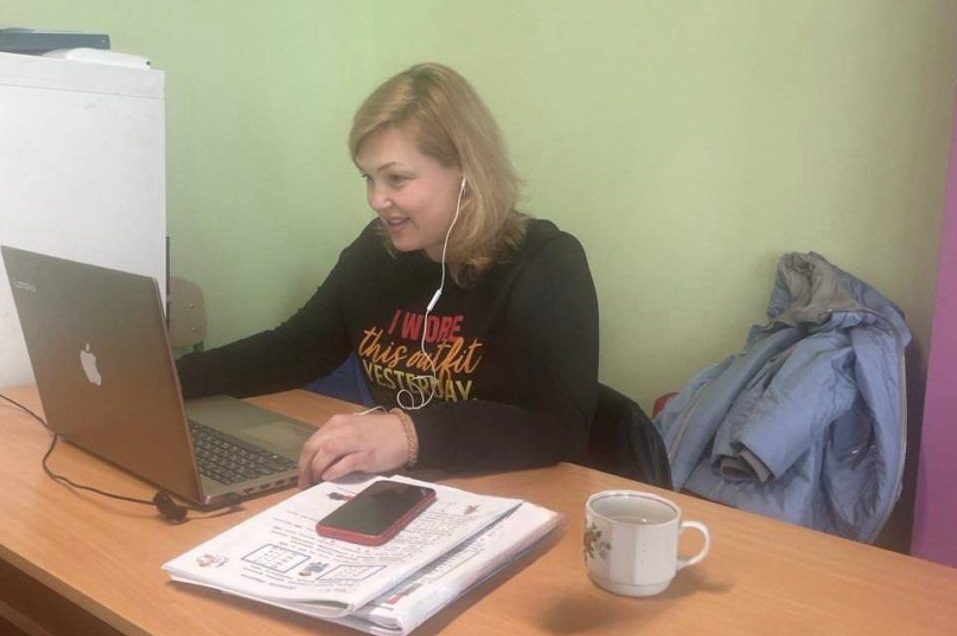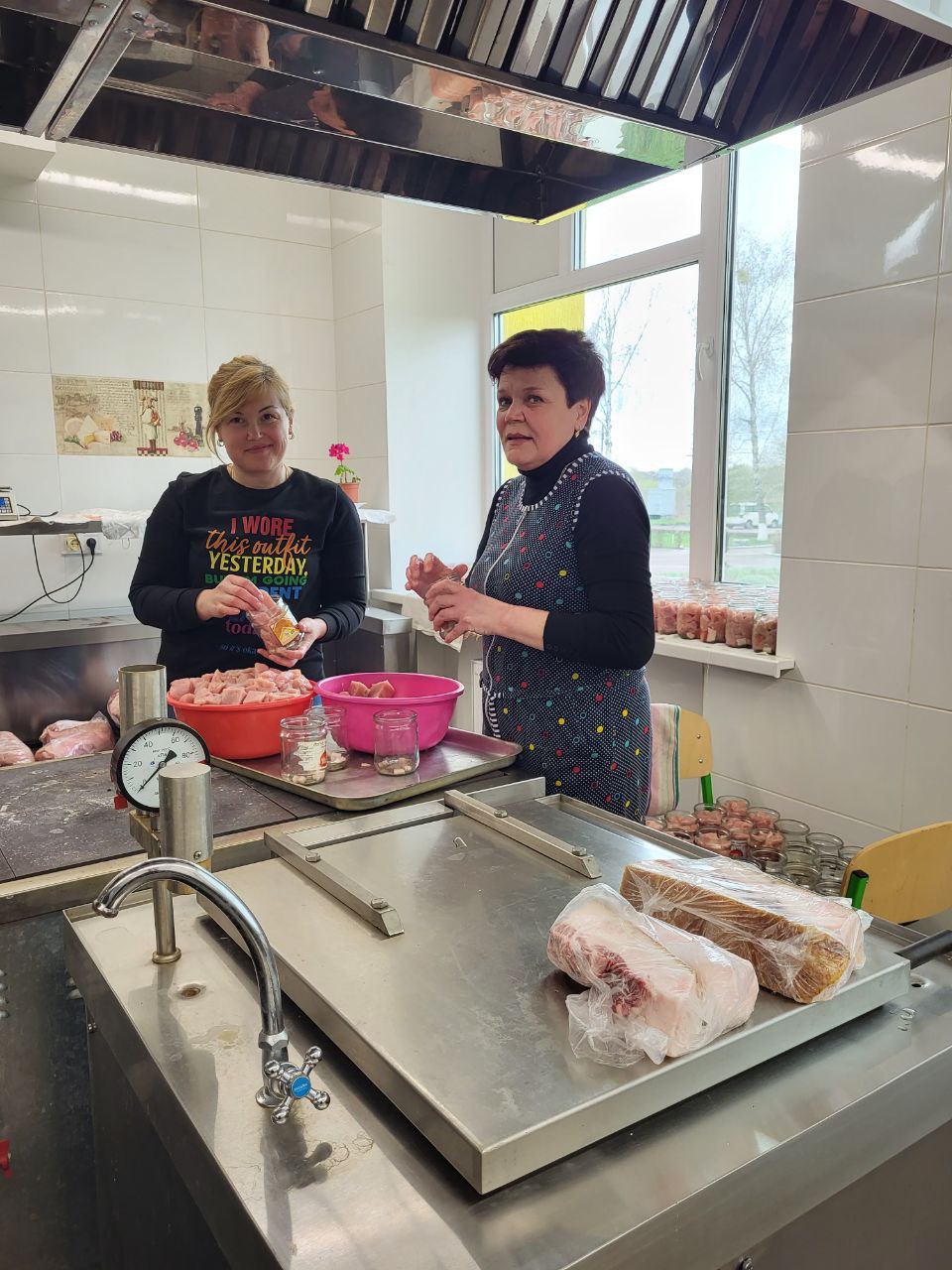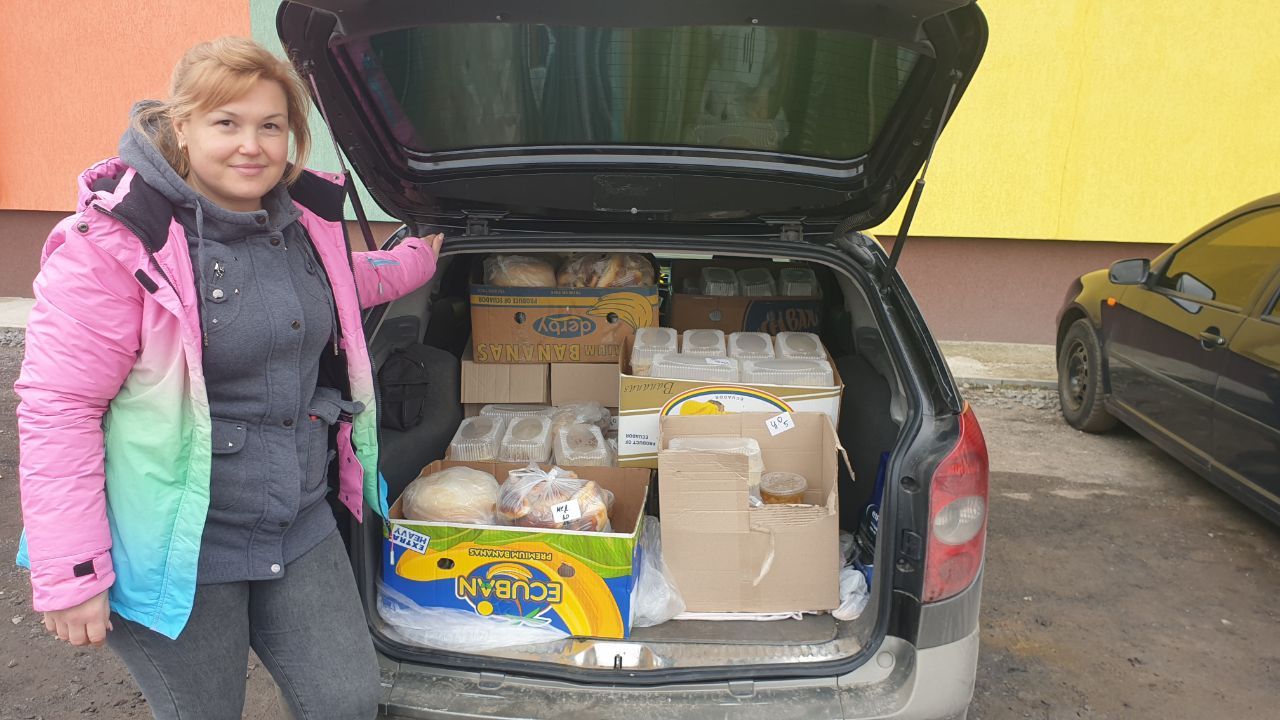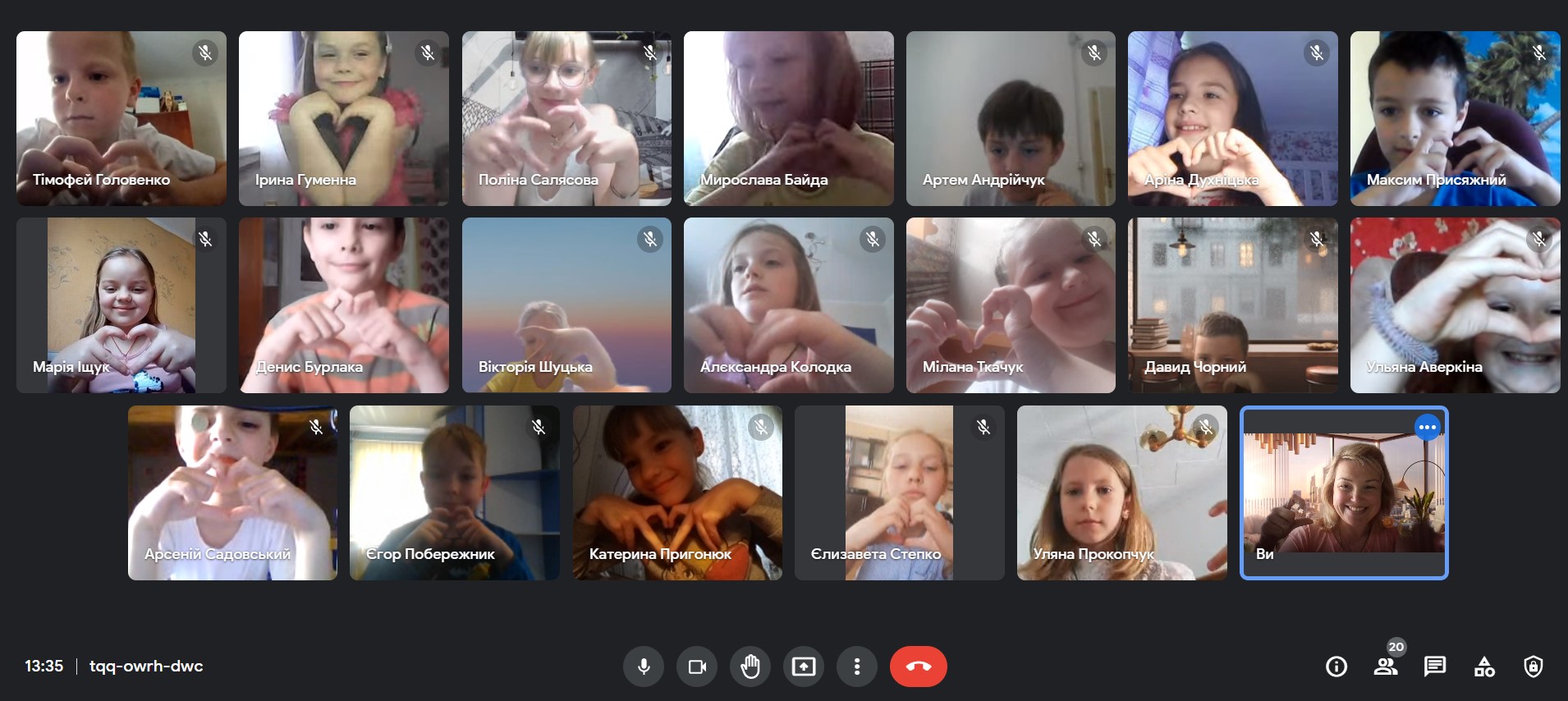Interview 5. Restoring Faith in Your Strength. Tetiana Boiko
Teacher Tetiana Boiko tells us how to pack and deliver food between lessons, cooperate with Italian teachers and stimulate children’s motivation to study.
Berdychiv educators and other concerned residents have created a reliable rear in the fight against the russian occupiers — between lessons, they are actively volunteering, helping the Armed Forces of Ukraine, the Territorial Defense Forces and internally displaced persons fleeing dangerous territories. “Fortunately, there were no active hostilities in our city,” says Tetiana Boiko, a primary school teacher at Berdychiv Gymnasium-Lyceum No.10. During the war, Tetiana has a crazy, fast-paced life — volunteering, strengthening her own teaching skills, conducting developmental classes Piznavaika at the Junior EdCamp Academy and using the principles of humane pedagogy in her classes to preserve the children’s mental health.

Ukraine on fire
When the war began, I made a clear association with Oleksandr Dovzhenko’s documentary war film Ukraine in flames. I found a book in my parents’ library, reread it, and saw a lot of accurate and subtle details about us and our country. For example, an old German colonel introduced his son to the people of Ukraine and said, “Only high-class people can defy and die the way Ukrainians die. Their vitality and disdain for death are limitless.” Nowadays, it’s surely different; 80 years have passed since the Second World War, but the people are the same. Dovzhenko also wrote that Ukrainians had forgotten about their “nation” and remembered only the adjective. So, the main lesson of this war is to make us, Ukrainian men and women, stronger, an integral part of own own nation.
I am very proud that I am Ukrainian, born in this land and in this time. I am proud of belonging to Ukrainian society. This sense of pride erupted with renewed vigour from the early days of the war. I am infinitely proud of and bow to the people who gathered together to help others, and are doing so now.
A sincere gift
Constantly monitoring the news in the early days of the war, I realized that I couldn’t just sit and wait. A humanitarian center was established in our city, where hot food was prepared. I joined the other volunteers and we prepared meals for the Armed Forces, the Territorial Defense Forces, , and for IDPs who were arriving from the very first days. We worked with no days off and no rest. On the first day, we prepared 300 hot lunches consisting of first, second and third courses; before that, we didn’t even know each other. I’m happy to be engaged in this rightful cause.
Among the volunteers, there were many teachers. I was touched by how willingly they set to work, including the most common jobs – washing the floor, dishes, cleaning vegetables, tidying up. What struck me the most was how sincerely people shared many food products with the volunteers, offered their help. I can still see a grandma who brought a bundle of buckwheat and lard scraps – maybe it was the last thing she had.

Before the war, when we met in educational communities, I often said that 24 hours a day were not enough for me. And if you analyze what happens in a day now, we manage to do an incredible amount of work. I did my very utmost and even surpassed myself. And despite the fact that I had to stand on my feet all day, I also conducted lessons at the same time. In the morning, I woke up, packed my faithful laptop – my work friend and associate – into the backpack, and travelled to the other end of the city. There, we cooked and gave lessons; during breaks and gaps between lessons, we packed food and transported it to where it was needed. For me, this is a worthy, but not a heroic deed.


I can still see a grandma who brought a bundle of buckwheat and lard scraps – maybe it was the last thing she had.

Staying at home
Once, I gave up – during the second week of the war, when I saw evacuation trains. A lot of people tried to get on and children were passed through the windows. It seemed to me that all my acquaintances had left. Relatives called me and asked me why I was not taking my child away. The last straw were the empty shelves in stores. All this overwhelmed me. I ran home and ordered my child to pack. But she, though worried, reacted surprisingly calmly and said, “Mom, we are Ukrainians. Why do we have to leave our native land? I’m not going anywhere.” Her logic hit me hard. So we stayed.
Indeed, it was our land that became the resource from which I drew my strength. Since the beginning of the war, my daughter and I have been living at my parents’ private home. I watched nature wake up after winter, had an opportunity to plant flowers and sow greens, and it was great. My cultural memory must have been activated — I felt I was a descendant of the Trypillians; I had a physical sensation of being filled with energy and strength.
Also, my daughter and my mother have been supporting me throughout. My daughter never let me go – of course, we were all scared because of the situation in the country and the region. But we believed everything would be fine.
Educational front
The Berdychiv community faced the same educational problems as other rear regions of Ukraine. According to Valentyna Adamenko, the head of the city department of education and science, more than 3,000 students left the community, and the distance learning process suffered interruptions due to unstable connection and air alerts. The administration planned to catch up in August by holding live lessons, individual classes and consultations. But only if the war is over.
To help Ukrainian educators continue to teach children during the war, EdCamp Ukraine launched a crowdfunding campaign – fundraising for computer equipment and Internet access for teachers who lost their pedagogical equipment in the war. Also, the funds will be used to provide psychological support to teachers and to organize conferences, where they can share their pedagogical experience during the war. Both foreign citizens and Ukrainians can join the campaign on the GoFundMe platform on the EdCamp Ukraine page, by adding a comment – My War. Lessons – to the payment.
Frightened and silent
Since February 28, we have resumed work; the educational process is carried out online. It’s said that everything happens for the best. Quarantines have tempered us, taught us how to work online. It turned out to be a good rehearsal.
I’m a primary school teacher; now I teach second grade pupils. The hardest part was to start the first lesson. Because I knew that the pain I felt would be transmitted to the kids. I realized that the parents were also agitated; children would not be the same again, and we would continue to see this many years later.
I remember our first war lesson. Usually, children want to speak out, and it’s not easy to calm them down and start a lesson. But then, I saw frightened eyes and completely silent children. I realized I couldn’t conduct the usual scheduled lessons; I had no moral right to do that. I had to stir them up a little. In the first two weeks, we had the first unofficial lesson that I started with a physical exercise to shift their attention from the war. I gave developmental tasks for reaction, speed and attention. Thanks to this practice, I was able to recognize my kids; they were returning to what they ahd been before the war. I also try to praise them more, talk about their victories, positive moments. I try to read their inner state by studying their appearance; I point out their mistakes with more loyalty, using methods of humane pedagogy to make them feel more protected.
The most striking change is that the children’s motivation to study has dropped. I can see it from conversations with my colleagues and from my daughter as well. We have to correct this; we need to recover the children’s faith in their own strength and confidence that the knowledge and skills gained at school will still be needed in the future.


I remember our first war lesson. Usually, children want to speak out, and it is difficult to calm them down. But then, I saw frightened eyes and completely silent children.

Expanding geography
Many children have come to our educational institution, and now they are our pupils. In my class, I have a girl from Chernihiv. She has adapted well; the children have accepted her. She has a lot of friends now; I think we helper her adapt nicely and gently. Who knows, maybe she’ll stay with us for a while.
Meanwhile, most of the children in my class left Ukraine with their parents, but many of them did not want to attend local educational institutions and continued online education together with the kids who remained in Ukraine. One of the pupils went to Italy. This boy’s mother called me once because local educators wanted to talk to me. Conversing with them, I noticed how much effort they put into helping the child adapt. My Italian colleagues wanted to hear my opinion on how best to help the child adapt in their country. They were surprised that we, Ukrainian teachers, had organized such quality online classes since the first days of the war. They were amazed that we continued to work and support our children in a dangerous area. We talked for an hour and a half; I told them about our projects with the children, informal communication, and shared my experience in adapting educational material to today’s conditions. We have planned further work, which we will carry out together with the school where this boy studies.


Italian teachers were amazed that we continued to work and support our children in a dangerous area.

Unvanquished
The only thing that holds us together now is the inner power in each and every one of us. I think inner power would be the leading topicof EdCamp’s upcoming event if I were to organize it. I think it’s important to tell people’s stories, about their inner power, what motivates and inspires them to move on and resist in these hard times. After all, many educators are fighting in the Armed Forces of Ukraine; they work in the rear or they volunteer. So, the inner power that is holding and fueling us is what we should be talking about now.
I personally would like to get to the EdCamp in our Ukrainian Mariupol and talk to the teachers who did not yield, did not consent to the barbaric demands of the occuiers. I really want to hear their stories.
Psycho-social support
From the beginning of the war, I’ve been volunteering, combining this with work, preparing for my second diploma and the Unified State Qualification Exam. But I felt that I could do more. At this point, I was offered a teaching post at EdCamp Academy where I could conduct developmental classes that help distract kids from current events. For many of them, this was the only way to participate in educational activities, because the children, who could not attend classes in their schools, were able to join our lessons. Thanks to EdCamp Academy, I lead an entire cycle of lessons that are not part of a separate educational program and help children have a good time, switch the focus of their attention and ensure their mental well-being. Therefore, I can share these insights.
Text – Halyna Kovalchuk.
The interview series My War. The Lessons was prepared with financial support from the Black Sea Trust for Regional Cooperation – a project of the German Marshall Fund of the United States.
The views and opinions expressed are those of the author and do not necessarily reflect the official policy or position of EdCamp Ukraine and the Foundation.









